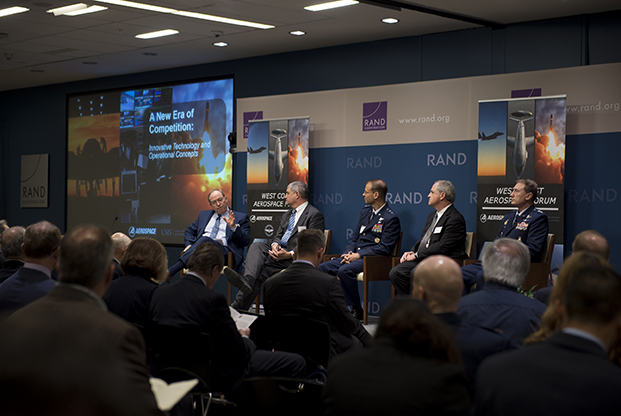
All of the panelists highlighted the need to think in a multi-domain fashion—one of Chief of Staff Gen. David Goldfein's top focus areas. RAND Corporation photo by Diane Baldwin.
The Defense Department must harness innovation when developing new operational conceptions, but it also needs to ensure that real-world pragmatic perspectives are driving the decision-making process, according to experts at the West Coast Aerospace Forum in California last week.
“We need to be careful about falling in love with technology, versus starting with an operational concept. It all comes down to the problem we are trying to solve,” said Bill LaPlante, senior vice president and general manager for MITRE National Security Sector.
Maj. Gen. Clinton Crosier, director of the Air Force’s warfighting integration capability, said the service is working to better integrate requirements with funding priorities, having recently “evolved 12 stove-piped efforts” into one cross functional integration, allowing “for deliberate planning across all domains and mission areas.” Part of this effort also includes championing high-potential areas of future investment that may yield broad levels of return, but may not have found a champion within the legacy bifurcated system, Crosier added.
Thanks to dedicated, predictable funding streams airmen are now able to test prototypes in the field over extended periods of time and provide insightful inputs that may have been missed in the lab environment, said Greg Spanjers, chief scientist of the Air Force Strategic Development Planning and Experimentation Directorate.
“We do not want to limit experimentation to the technologists, but instead need to expand into the operational domain to understand realistic scenarios,” Spanjers said.
However, finding the time to think about future innovation is not always easy for operational units that are constantly deploying and struggling to keep pace with their daily missions.
“How do you want our operational planners to focus their time? We need to look at tomorrow to do our jobs. However, parallel development on future concepts is quite useful, for it allows us to also consider the potential of future systems while not crushing what we need to do here and now,” noted Maj. Gen. Stephen Williams, Pacific Air Forces director of air and cyberspace operations.
All of the panelists highlighted the need to think in a multi-domain fashion—one of Chief of Staff Gen. David Goldfein’s top focus areas.
“Within the Air Force, we need to stop thinking about air, space, and cyberspace in a segregated fashion,” Crosier said. “It is really about holistic operations that delve into particular domains on the way to netting an end point effect at a given time and place.”
The West Coast Aerospace Forum was hosted by AFA’s Mitchell Institute, the RAND Corporation, Aerospace Corporation, and the Center for Strategic and International Studies.
